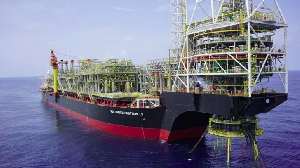A lot has happened to Ghana Telecom (GT) since the NPP government won the last elections. While the civil liberties under the current NPP government have improved tremendously, other areas such as Telecommunications and Information Technology policies continue to be weak and impractical.
Although the government of Ghana still owes 70% of Ghana Telecom ever since the NDC government sold 30% of the company to G-Com, Ghanaians have not been allowed to manage the company since 1996.
Since the beginning of 1997, Ghana Telecom has been managed by both the Malaysians for 5 years (1997 thru 2002) and Telenor Management Partners (TMP) for almost 2 years (2002 to the present) and yet GT’s services remain extremely poor even by African standards. GT’s fixed-line services and wireless services are woefully poor because the company lacks skills and processes necessary to operate a world class telecommunications company.
For several years, Ghanaians are used to completing a call after an average of 5 call attempts on both GT’s fixed line and One-Touch wireless lines. Personally I have received several announcements when trying to reach users on ‘020’ numbers. The announcements usually go like this:
as well as “Network Busy”. This happens even if the user is standing next to me at the airport residential area with the phone turned on. GT will be liable to pay several fines in most countries but they are allowed to get away with intolerably poor service in Ghana. Overall, telecommunications services in Ghana are so bad that I find it more practical and cost effective to use e-mail than SIM Cards or fixed line. In this article I would like to concentrate on the following stakeholders:
1. Malaysia Telecom’s role
2. Ex-Minister Felix Owusu-Agyapong
3. Telenor Management Partners (TMP)
4. Ghanaian Personnel at Ghana Telecom
I do realize that actions by other stakeholders such as the National Communications Authority (NCA) have direct bearing on activities of Ghana Telecom. Nevertheless, I have decided to concentrate on the impact of actions of the key stakeholders.
Telecommunications in Ghana is a mess because it is the twin pillars of corruption and mismanagement that have bedeviled the company over the past 23 years. The antecedents of the successive governments’ misguided policies can be traced to the fact that telecommunications licenses, a national resource, were given out free of charge to Mobitel (Millicom), Scancom, CellTel and Ghana Telecom. Maybe we need to learn a few lessons from the Nigerians when issuing wireless licenses.
Malaysia Telecom’s Role
The following catalogues the detrimental role the Malaysians played in the management of GT:- 1. Absence of performance targets between Ghana Telecom and Telekom Malaysia
2. No annual review of performance targets
3. Absence of Ghanaian representation at the executive level of Ghana Telecom
4. Absence of transparency during the tenure of the management team
First, they needed to ‘buy-out’ the only Ghanaian executive at Ghana Telecom, at the time - the CFO. They purchased his loyalty with a brand new ‘C’ Class Mercedes-Benz. Nine months after employees from TMP took over from the Malaysians, they made sure that there were no Ghanaians looking over their shoulders so they got the government to fire the CFO in 2003.
The Malaysians committed themselves to installing 50,000 fixed lines a year. However, they were unable to meet this target. What they did was to persuade the NDC government to issue a wireless license to Ghana Telecom. One reason for the change of targets is that Annual Revenue Per User (ARPU) from the fixed line business was going down so they were unable to earn the expected ROI from their initial investment.
Two years after the Malaysians received the go-ahead from the government, they issued an RFP for the installation of a GSM infrastructure. The contract was awarded to Motorola at the beginning of the year 2000, to install 70,000 mobile lines in the country. There was no transparency during the period that the Malaysians were managing the company. Income statements were not presented to the larger Ghanaian community. Therefore no one really knows the financial impact of their decisions between 1977 through 2002.
Although the 7-member Board of Directors at Ghana Telecom are ultimately responsible for guiding the company into the 21st century, this did not happen. There were no specific criteria used by the government in hand-picking the board members. This is obviously a recipe for disaster. In effect, what we have is a classic case where business decisions are been made by politicians!
Ex-Minister Felix Owusu-Agyepong
I would like to believe that the main priority of the NPP and the NDC governments are to improve the standard of living of all Ghanaians. In the digital age, an efficient and effective telecommunications infrastructure will undoubtedly help all Ghanaians in this effort. It is the right of every Ghanaian citizen who is willing to bear the cost, should have access to telecommunications services irrespective of who they are; it should not be a privilege for the wealthy or those with political connections. Those in rural areas will enjoy the same level of telecommunications services just like their urban brethren.On assuming the mantle of leadership, the NPP sought to rectify the disappointing state of affairs at GT. The new leadership of the country declined to renew the 5-year management contract previously offered to the Malaysian firm. The then Minister of Communications, Mr. Felix Owusu-Agyepong, spearheaded the effort to replace the Malaysians with another strategic investor. In retrospect, however, the performance of the Minister was tantamount to a blind man leading a blind colleague! Mr. Owusu-Agyepong really had no business managing affairs of Ghana Telecom and had no interest in learning about the telecommunications industry in order to avoid the pitfalls of such a dynamic and complicated industry.
Initially, it appeared that he was interested in bringing in an entity who will purchase shares from the government effectively buying out the Malaysians and providing the requisite capital investment to fund equipment purchase and other infrastructure with the expressed purpose of increasing broadband lines in the country. This effort ended in the signing of an MOU with TMP. The government paid a whopping US$ 1.2 million to TMP to develop a ‘dodgy’ business plan. What’s wrong with this picture? A lot is wrong with it. What’s in the business plan? If the leadership of the NPP government are well-educated Ghanaians, then why are they selling out to the Norwegians? While details of the business plan have not been made public, it appears that the main objectives of the plan are the following:
- 1. Staff of Ghana Telecom will increase from 3,000 to 6,000 when the management contract with TMP ends in 2005
2. Increase the total fixed lines by 400,000 lines within 2 years (mid 2004).
3. Provide management expertise and technical services
4. Improve quality of service and extend service to under-serviced areas
5. Improve financial health of the Ghana Telecom
Most contracts restrict total number of expatriates in order to increase location participation and lower the overall cost of the project. Usually the total number of expatriates employed by the consultant is about 10 to 15 individuals. As of now, TMP has employed a total of 31 expatriates at Ghana Telecom. This requires further investigation by law enforcement authorities in Ghana.
What has happened at GT appears to be the case of corrupt politicians whose only objective is to enrich themselves without any concern for the impact of their actions on the larger population they have sworn to serve. It is a result of this blatant disregard for the interest of the Ghanaian public by both the NDC and the NPP governments that Ghana Telecom is in the throes of ineptitude and disappointing performance.
Telenor Management Partners (TMP)
Since the MOU was signed by Mr. Owusu-Agyapong during the week of July 20-2002, the following events have transpired. Just as the previous government gave the Malaysians a ‘blank check’ and looked the other way for most of the period between 1997 and 2002, the current government has not learned from the bad experiences between the NDC and the Malaysians.The key executives at Ghana Telecom are all Norwegians employed by TMP. The officials include the Chief Executive Officer (CEO), the Chief Technical Officer (CTO), and the Chief Financial Officer (CFO). Again this is every consultant’s dream come true. In addition, TMP has saddled GT with 31 additional employees. Virtually, all of the employees are Europeans. Why is the NPP government creating jobs for Norwegians and other Europeans, when several Ghanaians in the diaspora who would relish the opportunity to return to Ghana to serve their country can perform the same task, if not better?
Ghana Telecom is paying a total of US$150,000 a month for the CEO, CFO and CTO. Sources at both GT and Ministry of Communications inform me that, each of the 30 employees is paid US$10,000 a month. Therefore the total amount paid to TMP is approximately US$3.9 million annually, this amount does not include US$150,000 fee paid monthly to TMP. Therefore, the total amount paid to TMP annually is approximately US$ 5.7 million. This is a lot of money for a country that has just qualified for the Highly Indebted Poor Country (HIPC) program. There are 4,100 Ghanaians at Ghana Telecom and their total annual pay is US$ 1 million. Obviously, this is fraud on a grand scale. This will make our forefathers turn over in their graves! Evidently, Ghanaian leaders are yet to learn from the mistakes of the past.
As of today, TMP has not employed a single African or Ghanaian to work with them at Ghana Telecom. Sources have informed me that they have in effect sidelined the Ghanaian employees at GT and have replaced almost all of them with Europeans and a couple of Americans. In this regard, I believe Telkom Malaysia performed a lot better than TMP. Is TMP discriminating against Ghanaians?
On Wednesday, November 26th, 2003, the Statesman, a local newspaper reported that the CFO of Ghana Telecom, Mr. Oskar Seim, was quoted in a newspaper report that if the NCA goes ahead and liberalize the international gateway, then they have to lay off between 800-1,300 of Ghana Telecoms 4,100 workforce. Based on this statement it appears that Ghana Telecom will need to layoff all of the 31 Norwegians and none of the Ghanaian personnel. In this thinly-veiled threat, TMP is planning to meet the targets in the business plan if and only if Ghana Telecom has a monopoly on international traffic.
After 19 years of unabashed corruption, mismanagement, arrogance and malfeasance among the NDC party, most Ghanaians felt that it was time to opt for better leadership. As far as Ghana Telecom is concerned, so far the NPP government has been a major disappointment. I do question the wisdom of bringing in foreign consultants to manage a national entity that has several implications for the development of the country as well as national security. It is also mind-wrenching that the NPP government has signed an MoU with TMP when there are several Ghanaians both in the country and outside Ghana who can perform the same work and demand less salary and perks.
Actually, the entire affair has become scandalous. In the summer of 2003, TMP signed a contract to purchase a total of US$ 80 million worth of telecommunications infrastructure from Alcatel Shanghai. TMP appears to lack the requisite skills required to improve Ghana Telecom’s operations. In this scenario, they resort to bill the customer as much as possible to cover their high operating costs.
Most of the personnel working at Ghana Telecom were hired specifically to work at Ghana Telecom. Since TMP does not have in-house personnel to perform the work, they in turn will sub-contract the key aspects of the contract to other companies. At the moment, it is known that TMP has signed contracts with an Indian company to provide additional services to GT. Other contracts have been awarded to Lebanese companies as well. None of the contracts have as yet been awarded to Ghanaian companies. It is quiet surprising to note that among the US$150 million spent on telecommunications infrastructure and services, Ghanaian companies and the Ghanaian economy did not receive even one cedi but the citizens of Ghana have had to pay up the total amount in the form of taxes.
Employees at Ghana Telecom and the General Population
One of the daunting tasks facing GT is a culture of corruption, mismanagement and fraud. Corruption exists on a grand scale partly because there is no incentive for GT employees to perform. How can this mammoth culture be changed when such a major discrepancy in salaries exist?Employees at Ghana Telecom have been through a lot. They are asked to sacrifice to improve the firm’s performance while receiving only a pittance. Yet Norwegians who may not have the requisite skills to perform similar work are being paid thousands of dollars more. This is unacceptable.
The role of the government within the ICT sector is not to hire management consultants to manage affairs at Ghana Telecom. The government’s role is to ensure that there is level playing field among all stakeholders within the ICT sector by appointing competent professionals who will lead the NCA. Additionally, it is the responsibility of the Board of Directors at GT to hire a competent CEO who in turn is accountable to the Board.
TMP employees at GT are unable to meet the targets set by the government as agreed to in the original business plan written by TMP. However, sources from the President’s office have confirmed that the government will renew TMP’s contract anyway for another 2-3 years. From whatever perspective one analyzes it, this is difficult to understand. It also seems to show that the current leadership really does not appear to appreciate the role of ICT policy as well as intricacies of the telecommunication industry as a catalyst for economic development.
This time Ghanaians do not have to wait after a change in government but should stop the government from these malicious and shameful decisions that have had detrimental consequences to Ghana’s economy by turning to the law courts in Ghana and even outside Ghana in cases where it is feasible.
Facts & Figures
ContractsGSM Contract w/ Motorola US$41.5 million to install 70K lines
– Telekom Malaysia GSM & Fixed line w/ Alcatel is worth US$80 million to install 400K lines
– TMP Amount paid by GT to TMP for Business Plan – US$1.2 million
GT’s profit in 2002
Total Number of lines in service
Average Revenue Per User (est 2002) US$19.00
Shareholding Ghana Government’s Share of Ghana Telecom 70% Telecom Malaysia ownership of Ghana Telecom 25.5% Total owed by G-Com 4.5%
Telecom Malaysia Purchased GT 25.5% shares for US$38 million Telecom Malaysia paid another US$ 50 million for Additional 15% share Malaysia Telecom’s exclusive 5-yr management contract ended on 02-19-2002 A 3-month grace period ended on May 18 2002
Personnel
Payroll
Total Number of fixed lines in operation at Ghana Telecom 240,000
Teledensity Ratio 1.0

Views expressed by the author(s) do not necessarily reflect those of GhanaHomePage.














